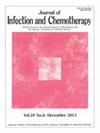日本个体化噬菌体治疗耐药菌的可行性研究。
IF 1.5
4区 医学
Q3 INFECTIOUS DISEASES
引用次数: 0
摘要
导读:个性化噬菌体疗法在欧美用于治疗耐药细菌引起的难治性感染。本初步研究旨在为日本个体化噬菌体治疗的临床试验获取可行性数据。方法:一项观察性研究于2023年8月至2024年9月在耐药细菌感染和治疗失败或抗生素治疗后复发/复发的成人中进行。然后从环境和现有噬菌体文库中鉴定出对检测到的细菌具有活性的噬菌体。结果:共纳入30例耐药细菌感染患者。其中6例(20%)在检测到的30天内死亡。最常检出的细菌为耐甲氧西林金黄色葡萄球菌(MRSA) (n=10, 33.3%)和耐碳青霉烯绿脓杆菌(CRPA) (n=5, 16.7%)。最常见的非结核分枝杆菌(NTM)为鸟分枝杆菌(n=4, 13.3%),其次为脓肿分枝杆菌(n=2, 6.7%)。从感染类型来看,呼吸道感染最常见(n=13, 43.3%),其次是骨骼和关节感染(n=6, 20%)和皮肤软组织感染(n=6, 20%)。30株菌种中有26株的噬菌体滴度在108 PFU/ml以上,占86.7%。与MRSA和NTM相比,抗CRPA噬菌体更容易从环境中识别出来。纯化出抗CRPA噬菌体,其脂多糖浓度为0.023 EU/108 PFU。结论:可制备个体化噬菌体用于耐药菌引起的难治性感染。这些结果支持在日本实施个性化噬菌体治疗的临床试验。本文章由计算机程序翻译,如有差异,请以英文原文为准。
A feasibility study for personalized phage therapy against drug-resistant bacteria in Japan
Introduction
Personalized phage therapy is used in Europe and the United States to treat intractable infections caused by drug-resistant bacteria. This pilot study aimed to acquire feasibility data for clinical trials of individualized phage therapy in Japan.
Methods
An observational study was conducted from August 2023 to September 2024 in adults with drug-resistant bacterial infections and treatment failure or recurrence/relapse following antimicrobial therapy. Phages with activity against the detected bacteria were then identified from the environment and an existing phage library.
Results
Thirty patients with drug-resistant bacterial infections were enrolled. Of these, six (20 %) died within 30 days of detection. The most commonly detected bacteria were methicillin-resistant Staphylococcus aureus (MRSA) (n = 10, 33.3 %) and carbapenem-resistant Pseudomonas aeruginosa (CRPA) (n = 5, 16.7 %). The most common nontuberculous mycobacterium (NTM) was Mycobacterium avium (n = 4, 13.3 %), followed by Mycobacterium abscessus (n = 2, 6.7 %). In terms of infection types, respiratory tract infections were the most common (n = 13, 43.3 %), followed by bone and joint infections (n = 6, 20 %) and skin and soft tissue infections (n = 6, 20 %). Phages with a titer of 108 PFU/ml or higher could be prepared for 26 out of 30 strains (86.7 %). Phages against CRPA were more readily identified from the environment than for MRSA and NTM. A phage against CRPA was purified to a lipopolysaccharide concentration of 0.023 EU/108 PFU.
Conclusion
Personalized phages can be prepared for intractable infections caused by drug-resistant bacteria. These results support the conduct of clinical trials to implement personalized phage therapy in Japan.
求助全文
通过发布文献求助,成功后即可免费获取论文全文。
去求助
来源期刊

Journal of Infection and Chemotherapy
INFECTIOUS DISEASES-PHARMACOLOGY & PHARMACY
CiteScore
4.10
自引率
4.50%
发文量
303
审稿时长
47 days
期刊介绍:
The Journal of Infection and Chemotherapy (JIC) — official journal of the Japanese Society of Chemotherapy and The Japanese Association for Infectious Diseases — welcomes original papers, laboratory or clinical, as well as case reports, notes, committee reports, surveillance and guidelines from all parts of the world on all aspects of chemotherapy, covering the pathogenesis, diagnosis, treatment, and control of infection, including treatment with anticancer drugs. Experimental studies on animal models and pharmacokinetics, and reports on epidemiology and clinical trials are particularly welcome.
 求助内容:
求助内容: 应助结果提醒方式:
应助结果提醒方式:


